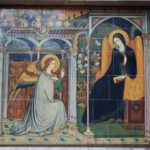This post was originally published on Public Discourse on December 20, 2o23. This first week of Advent, we hope you enjoy revisiting these reflections.
Advent, meaning “arrival” or “appearance,” is a liturgical season of expectation and preparation for the coming of the promised Messiah.
This year, Advent seems particularly weighty. We have recently witnessed a brutal start to a new war between Israel and Hamas and the twenty-first century’s biggest surge of antisemitism, coming on the heels of other wars and rumors of wars as well as intensifying civil strife and moral decay at home.
These recent events are just the latest iterations of millennia-old evils that continue to torment a dark and broken world. They are reminders that the first advent is but a partial fulfillment of the peace for which we yearn and that our souls long for our heavenly home. Christians would benefit from retrieving a historic vision of the Advent season—a theologically rich tradition that is rooted in both church history and Scripture and that looks beyond the Incarnation to Christ’s Second Coming.
Start your day with Public Discourse
Sign up and get our daily essays sent straight to your inbox.Christians would benefit from retrieving a historic vision of the Advent season—a theologically rich tradition that is rooted in both church history and Scripture and that looks beyond the Incarnation to Christ’s Second Coming.
God Is Not Dead, Nor Does He Sleep
Advent is derived from the Latin noun adventus, which is often translated as “arrival” or “invasion.” The term also refers to the formal ceremony that celebrated a great king’s triumphal entry into the city to take up his royal residence. Adventus marked the beginning of his new reign and the inauguration of a new era of security, peace, and blessing for the city. The Roman emperors and later the popes participated in this inaugural ritual.
In fourth- and fifth-century Gaul and Spain, the liturgical period later known as Advent was a forty-day season of fasting and prayer for new converts who would be baptized on Epiphany, a church holy day marking the visitation of the Magi (in the Western church) and Christ’s baptism by John the Baptist (in the Eastern Church). Roman Christians in the sixth century began to observe Advent as a time of preparation for the Second Coming of Christ. Only later in the Middle Ages was Advent associated with Christ’s Nativity.
Modern Catholic and Protestant liturgies fuse the first and second appearances of Christ in the season of Advent. Some in the evangelical traditions conflate Advent with Christmas, while others do not celebrate Advent at all. For many who do observe Advent, it remains primarily a season for reenacting Israel’s long wait for the promised Messiah and for looking with hope to the joy of celebrating the Incarnation.
But an Advent season that focuses solely on Christ’s birth is in tension with our present situation. The Messiah did come. But he has ascended to heaven, and the created order remains twisted and broken. The Son of God has saved his people from the guilt and power of sin but not yet the curse of sin. He has redeemed the world but has yet to remake it.
Meanwhile, we suffer, and God often seems disembodied, distant, and indifferent to our sorrows. The workings of Providence are entirely inscrutable to us. We suffer and grieve without knowing why. As the Preacher tells us in Ecclesiastes, life is a vapor, and death comes for us all. We are strangers in a foreign land, and we seek a heavenly country.
Moreover, God’s name is not hallowed, and God’s kingdom seems remote. In our disenchanted age, God seems so entirely removed from reality that he is easy to ignore—or forget entirely. And in a world torn by violence and strife, the declaration of God’s peace to the shepherds at the Nativity sometimes rings hollow. As Henry Wadsworth Longfellow lamented:
And in despair I bowed my head;
“There is no peace on earth,” I said;
“For hate is strong,
And mocks the song
Of peace on earth, good-will to men!”
But Longfellow does not yield to despair:
Then pealed the bells more loud and deep:
“God is not dead, nor doth He sleep;
The Wrong shall fail,
The Right prevail,
With peace on earth, good-will to men.”
God is not absent, and he does not sleep. And in the end, the right will prevail because the Lord will one day return and set everything aright. But meanwhile, we are called to wait. And this is hard for us.
In the end, the right will prevail because the Lord will one day return and set everything aright. But meanwhile, we are called to wait. And this is hard for us.
Two Advents: Two Sides of a Single Reality
Even though advent means “coming,” the season of Advent is one of waiting. Our waiting is expectant but indefinite and difficult. This was once Israel’s problem, and now it is ours. Like Israel, we are a holy nation in exile, awaiting the Messiah’s coming.
The Swiss theologian Karl Barth, in his Church Dogmatics, put it best: “What other time or season can or will the church ever have but that of Advent?” Advent is not only about retrospectively celebrating the Incarnation; it is also about prospectively preparing for the Second Coming: for the final, full revelation of Christ, who will once and for all judge the world and usher in an eternal age of perfect blessedness.
That is why in the liturgy of the church, the Advent readings include numerous passages on the eschaton and the final coming of the Lord. Apocalyptic passages from Isaiah, Jeremiah, and the minor prophets feature prominently in the lectionary, as well as New Testament passages such as Matthew 25, I Thessalonians 5, and, if you include the daily lessons, almost the entire book of Revelation. Why? Because the church has always understood that the first and the second coming must be understood together. Advent is the vanguard of the eschaton. It is the future kingdom breaking into our present. It is the future light shining into today’s darkness.
The two advents are two sides of a single reality. From our temporal perspective, the two advents appear to be entirely distinct, but God’s salvific work is not bound by time. Indeed, the Scriptures treat the first and second advents as intertwined and sometimes speak of them as essentially the same event. The coming of the Messiah is a single phenomenon with two phases. The second advent completes the first.
An Advent that focuses entirely on the Nativity is impoverished. It turns out that Christmas without the Second Coming is meaningless. A messiah who merely takes on flesh and shares in our sufferings is a comfort—but not a cure. We need a messiah who comes in power to empty the graveyards and to recreate the cosmos. We need a messiah who will “break the bow and the chariot” and “make wars cease to the end of the earth” (Psalm 46).
This is why Christians have confessed, in the words of the Nicene Creed, that they “look for the resurrection of the dead and the life of the world to come.” Christmas hope is either eschatological or it is empty. There is no other possibility.
Christmas hope is grounded both in the reality of Christ’s first advent and also in the reality that he will come again to fully establish the peace his princely rule has promised. This is one of the great paradoxes of the faith: Christ has come, and he is coming. The kingdom has arrived, yet we pray “Thy kingdom come.”
The Prince of Peace Has Come and Is Coming
So what does this mean for us?
It means we should prepare, for we are in the last days. The liturgical season of Advent provides a yearly reminder that as the church we live in the age of advent: the age of Christ’s coming. We are to live in the posture of the five faithful virgins who, in Christ’s parable, prepared themselves for the arrival of the groom and the beginning of the wedding feast.
The Apostle Peter, in a passage often employed as an Advent lesson, encourages holy patience and preparation:
But, beloved, do not forget this one thing, that with the Lord one day is as a thousand years, and a thousand years as one day. The Lord is not slack concerning His promise, as some count slackness, but is longsuffering toward us, not willing that any should perish but that all should come to repentance.
But the day of the Lord will come as a thief in the night, in which the heavens will pass away with a great noise, and the elements will melt with fervent heat; both the earth and the works that are in it will be burned up.
Therefore, since all these things will be dissolved, what manner of persons ought you to be in holy conduct and godliness, looking for and hastening the coming of the day of God, because of which the heavens will be dissolved, being on fire, and the elements will melt with fervent heat? Nevertheless we, according to His promise, look for new heavens and a new earth in which righteousness dwells.
The Prince of Peace has come and is coming.
In the penultimate verse in the Book of Revelation, we hear these last words from Christ:
“Truly, I am coming quickly.”
And what is our response?
“Amen. Come, Lord Jesus!”
Image by Natalia and licensed via Adobe Stock. Image resized.














